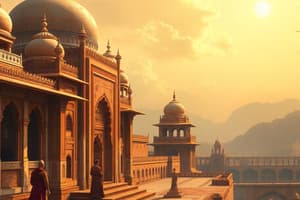Podcast
Questions and Answers
Who was the founder of the Mughal Empire?
Who was the founder of the Mughal Empire?
- Jahangir
- Shahjahan
- Babur (correct)
- Akbar
During whose reign did the Mughal Empire reach its peak?
During whose reign did the Mughal Empire reach its peak?
- Akbar
- Shahjahan (correct)
- Humayun
- Aurangzeb
Which Mughal emperor is known for introducing religious tolerance and a centralized administration system?
Which Mughal emperor is known for introducing religious tolerance and a centralized administration system?
- Humayun
- Akbar (correct)
- Babur
- Jahangir
What was the primary factor that led to the decline of the Mughal Empire?
What was the primary factor that led to the decline of the Mughal Empire?
Who was the Mughal emperor who defeated Sher Shah Suri and regained control of the empire?
Who was the Mughal emperor who defeated Sher Shah Suri and regained control of the empire?
Which of the following architectural marvels was built during the Mughal Empire?
Which of the following architectural marvels was built during the Mughal Empire?
Flashcards
Mughal Empire
Mughal Empire
A historical state in the Indian Subcontinent from the 16th to 19th century, founded by Babur.
Babur
Babur
Founder of the Mughal Empire after conquering northern India in 1526; descendant of Genghis Khan.
Humayun
Humayun
Reclaimed the Mughal Empire after exile but faced challenges from Sher Shah Suri and others.
Akbar
Akbar
Signup and view all the flashcards
Shahjahan
Shahjahan
Signup and view all the flashcards
Aurangzeb
Aurangzeb
Signup and view all the flashcards
Study Notes
Mughal Empire
The Mughal Empire, also known as the Moghul Empire, was a historical state based in the Indian Subcontinent from the early 16th century until the mid-19th century. It originated with Babur, a descendant of Genghis Khan through his grandson Chaghatai, who conquered northern India in 1526. Over time, the empire expanded under various emperors like Akbar, Jahangir, Shahjahan, and Aurangzeb, reaching its peak during the reigns of these kings. Afterward, it started to decline due to several factors such as internal conflicts, foreign invasions, and the rapid expansion of European colonial powers.
Babur's successor Humayun managed to regain control of the Mughal Empire after being exiled by Sher Shah Suri. However, he faced significant challenges, including defeats against Sher Shah and Rana Pratap Singh. After Humayun's death, his son Akbar ascended the throne, and his reign is considered one of the most prosperous periods in Mughal history. Akbar expanded the empire, introduced religious tolerance, and implemented a centralized administration system.
Under Akbar's son, Jahangir, the empire continued to grow, but it was during the rule of Shahjahan that the Mughal Empire reached its zenith. Shahjahan is particularly known for his architectural contributions, including the construction of the Taj Mahal, a mausoleum dedicated to his wife Mumtaz Mahal.
However, the Mughal Empire faced significant challenges during the reign of Aurangzeb. His military campaigns extended the empire's borders but also led to the financial drain of the empire. Aurangzeb's successors faced numerous rebellions and power struggles, which led to the decline of the Mughal Empire.
In the late 18th century, the Mughal Empire was reduced to the presidencies of Bengal, Madras, and Bombay. By the mid-19th century, the Mughal Empire had effectively ceased to exist as a political entity. Despite this, the legacy of the Mughals continues to have a profound impact on Indian culture, art, and architecture.
Studying That Suits You
Use AI to generate personalized quizzes and flashcards to suit your learning preferences.




